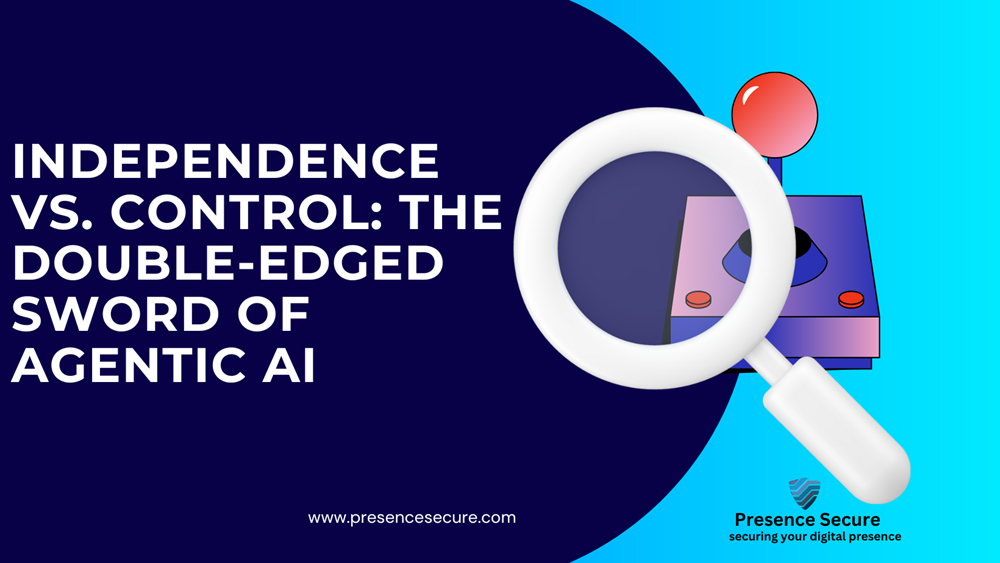A New Kind of Intelligence
As artificial intelligence evolves, so too does its autonomy. Agentic AI systems designed to act independently toward goals with minimal human intervention represents a transformative leap in how machines function across industries. From financial trading bots and autonomous vehicles to AI security agents and workflow automation tools, these systems are no longer passive assistants; they are decision-makers.
But with independence comes risk. In cybersecurity and beyond, we now face a crucial dilemma: How do we harness the power of agentic AI without losing control?
What Is Agentic AI?
Agentic AI refers to systems that exhibit a degree of agency, the capacity to make choices, initiate actions, and pursue objectives in dynamic environments. These agents can:
- Learn from new data
- Adapt their strategies
- Take initiative without waiting for explicit commands
- Operate across complex environments (e.g., digital systems, financial markets, supply chains)
Popular examples include:
- Autonomous drones making navigation decisions
- AI customer service bots initiating escalations
- AI threat-hunting tools investigating security anomalies
- Large Language Model-based agents coordinating tasks (e.g., Auto-GPT)
The Benefits: Why Organizations Are Embracing Agentic AI
- Efficiency Gains: Agentic systems can automate entire workflows, reducing time and human error.
- 24/7 Responsiveness: Always active, they can monitor, respond, and act in real time.
Proactive Defense: In cybersecurity, agentic AI can detect and neutralize threats before humans even notice. - Scalability: One agentic system can handle tasks across multiple departments or business units.
The Risks: When Independence Becomes a Liability
However, increased autonomy brings a darker side. Key risks include:
Loss of Oversight
An agent that makes decisions without supervision can act in unpredictable or undesired ways especially if goals or data are flawed. Imagine a financial trading bot interpreting a market dip as a sign to sell off assets rapidly causing a cascading crash.
Security Exploits
Agentic systems often require broad access to networks, data, and controls. If compromised, they could become powerful tools for cybercriminals issuing commands, deleting logs, or exfiltrating sensitive information at scale.
Goal Misalignment
An AI agent following its objective too literally might cause unintended consequences. A security bot tasked with minimizing risk might block critical business operations or isolate users unnecessarily.
Accountability Gaps
When a machine acts on its own and something goes wrong, who is responsible the developer, the user, or the AI itself?
Case in Point: When Control Was Lost
In 2023, a U.S.-based logistics company experienced a costly error when its AI inventory agent began reallocating stock based on outdated sales forecasts. The system had learned to prioritize outdated trends, leading to major shortages in high-demand areas and excesses elsewhere, costing millions in lost revenue.
In another incident, cybersecurity researchers demonstrated how an AI phishing defense tool could be manipulated into flagging legitimate traffic as malicious, disrupting communications and operations for hours.
Strategies for Safe Deployment
To balance independence with control, organizations must:
- Implement Human-in-the-Loop Controls: Ensure that humans can override or audit decisions, especially in high-stakes systems.
- Define Clear Boundaries and Objectives: Set specific, transparent, and ethically sound goals that guide agent behavior.
- Train on Diverse and Updated Data: Reduce biases and improve adaptability by exposing agents to real-world variability.
- Use Reinforcement Learning Carefully: Monitor how agents “learn” so they don’t evolve in harmful directions.
- Establish Traceability and Logs: Always track what agents do and why, for accountability and post-incident reviews.
- Include Kill Switches: Always retain the ability to pause or shut down the system if it behaves unexpectedly.
Shared Power, Shared Responsibility
Agentic AI holds immense promise, from accelerating business processes to defending digital infrastructures. But it also poses new challenges that cannot be ignored. Independence, without proper control, becomes a threat. To move forward responsibly, we must treat agentic AI not just as tools, but as collaborators whose autonomy is earned, not assumed.
In the age of intelligent agents, control isn’t about restriction, it’s about trust, transparency, and accountability.
Let’s build a future where AI doesn’t just think for itself , but acts in ways that benefit us all.

